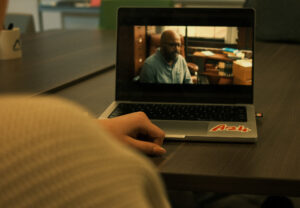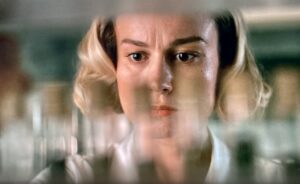Hannah Gadsby’s “Nanette” made headlines when it came out on Netflix in June. In the comedy special, she discusses her experiences as a butch lesbian in a small town, growing up in Tasmania, Australia, and gives a heartbreaking account of what she doesn’t like about comedy.
The comedy special begins with a humorous monologue about growing up as a lesbian in Tasmania and the homophobia she was exposed to from the very start. Despite the heavy subject matter of the entire show, the beginning of the comedy special utilized dark humor about identity and homophobia.
“In a place like Tasmania, everything’s very relative,” Gadsby says in “Nanette.” “But the wisdom of the day was that, if you chose to be gay, then you should just get yourself a one-way ticket to the mainland, and don’t come back. Gays … why don’t you just pack your AIDS up into a suitcase there and f*** off to Mardi Gras?”
The delivery of her jokes is what makes them funny rather than heartbreaking. Her awkwardness, intent and comedic timing allows jokes to evoke laughter from the crowd.
Throughout the show, she makes a series of jokes about the LGBTQ community being her people, delivered in a thick Tasmanian accent for effect. She also repeatedly jokes about “just, sort of, sprinkling in the lesbian content,” because of previous feedback that she was lacking in “lesbian content” in her comedy.
“No, I mean, if you were to plot my week, I don’t … Not a lot. Not a lot of lesbian-ing … gets done. I cook dinner more. I cook dinner way more than I lesbian. But nobody ever introduces me as “that chef comedian,” do they,” Gadsby said.
Many of her jokes are targeted at LGBTQ audiences; she tackles gender roles, high standards for lesbian comedians and anecdotes about coming out. When talking about her identity, she says, “I identify … as tired.”
As the show continues on, she repeatedly addresses the idea of leaving comedy. This results in the heart-wrenching delivery of a speech discussing her life and the issues she has faced. She takes on anti-gay violence she’s experienced first hand, being a minority in a field that relies heavily on self-deprecation and mental illness.
This section of the special is more reliant on personal anecdotes; it contains more feedback she has received about being medicated for mental illness, as well as stories of being beaten up for seemingly coming onto a man’s girlfriend and at other times being told that she was too sensitive. Even during this darker, heavier portion of the special, she peppers in humor; at one point, she tells the audience, “lesbians give feedback, men have opinions.”
Gadsby’s “Nanette” is both hysterical and heartbreaking in the way it portrays life as a member of a marginalized community. In just over an hour, Gadsby goes from light-hearted, humorous and awkward to raw emotion that grabs the audience and forces them to listen and understand her struggles. “Nanette” takes the definition of comedy and turns it on its head by giving the audience a laugh and breaking their heart all in the same breath.











